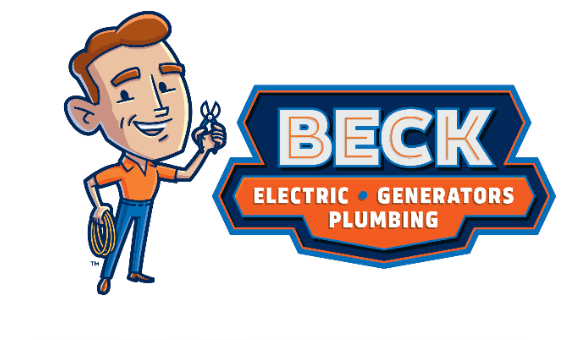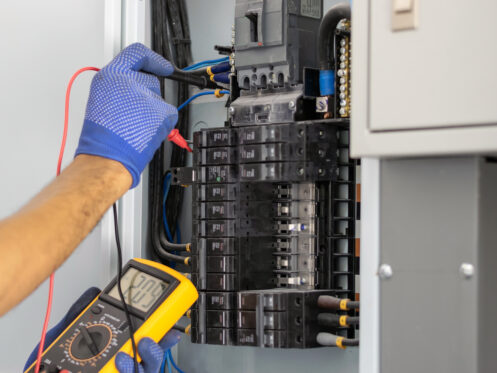Humidity refers to the amount of water vapor or moisture in the air. While outdoor weather and the environment can determine humidity, household activities can also affect the concentration of water vapor within your house. This is known as indoor relative humidity. Activities that impact indoor relative humidity can include showering, cooking, cleaning, or using HVAC appliances.
According to the Environmental Protection Agency (EPA), ideal indoor relative humidity should range between 30% and 50%. Furthermore, indoor moisture levels should never exceed 60%. When moisture levels are too high, you may see an increased risk of electrical problems. A look at the most common electrical issues associated with high humidity can keep you informed, and you can take steps to protect your home.
Rust and Corrosion
Corrosion and rusting of electronics are among the most visible effects of excessive household humidity. When humid air hits a colder surface, it condenses and forms water droplets. This condensation can spur oxidization on any metallic parts of your electronics and result in corrosion. Corrosion is an electrochemical reaction that causes the gradual deterioration of any metal.
Along with corrosion, condensation can also cause your electric wires and switch gear to rust. Rust is a reddish-brown substance that forms when metal alloys react to air and water. For example, wires made of copper or aluminum are prone to rusting after prolonged exposure to water. This can ultimately cause failure and complete equipment malfunction.
Short Circuits
Short-circuiting occurs when an electrical current travels along an unwanted or unintended path with little to no interference. Since water is a good conductor of electricity, excess moisture can increase the electrical current in dangerous areas with minimal interference. This can trigger the ground fault circuit interrupter (GFCI) or cause the circuit breaker to trip. The energy overload from short-circuiting can also result in power outages or blown electrical parts. Unexpected electrical currents also pose a safety hazard by increasing the risk of electric shock.
Overheating
Electronic devices like HVAC units or computers have internal blower fans that circulate air in order to reduce overheating. Unfortunately, high humidity can impede the circulation of air or cause corrosion to fan parts and make the equipment overheat. This puts undue strain on your equipment’s internal components, causing premature breakdowns and necessitating emergency repairs or replacements.
Higher Electricity Bills
Excess humidity can also cause higher energy bills. When the internal components of your HVAC unit have corroded due to condensation, the appliance must work overtime to compensate for an unstable electrical supply. This power consumption can raise utility costs because the HVAC system becomes less efficient.
Voltage Surges
Water vapor from high humidity can greatly damage your electrical wires. According to the Department of Energy (DOE), 80% of internal voltage surges result from rusting or corroded wires. If you notice burnt bulbs or lighting fixtures, a voltage surge may be the culprit. An electrician can confirm the frequency of surges. You may need to install a surge protector as a safety precaution within the home or replace wiring.
Flickering Lights
When condensation settles on walls or outlets, it can seep into light switches and cause unseen corrosion. This corrosion creates loose connections that result in inconsistent lighting. Household areas like kitchens or bathrooms are prone to flickering or wavering lights due to increased relative humidity caused by activities like cooking or washing that produce water vapor.
Premature Deterioration
Electronic devices like laptops, smartphones, and some chidren’s toys use batteries during operation. High humidity can allow moisture to penetrate the battery and result in swelling. If the battery absorbs too much moisture and corrodes, it can damage other internal components and result in you having to replace the items affected.
How to Mitigate the Impact of High Humidity in the Home
The first step in resolving humidity-related electrical problems is to schedule an inspection by a professional electrician. The electrician can identify any immediate safety hazards like corroded wires, locate sources of excess moisture in areas like basements or bathrooms, and prescribe solutions for households.
For example, the electrician may suggest installing a whole-home dehumidifier to remove extra moisture from the air and to help ensure that indoor relative humidity remains below 60%. The electrician may also recommend improving ventilation to increase airflow by replacing or installing vent fans. Mechanical ventilation will move moisture out of the house instead of it remaining concentrated in areas like bathrooms, kitchens, or laundry rooms.
Your household may also need an insulation upgrade in the attic or walls to stop current moisture issues and prevent condensation from seeping into your electrical system. Finally, routine maintenance of equipment that uses electricity can ensure that wiring and other internal components remain damage-free for the unit’s lifespan.
Contact Us Today
High humidity can cause serious problems for your electrical system. Fortunately, trained professionals can help. Beck Electric, Generators & Plumbing provides electrical services for homes in Canton, OH, and the surrounding areas. We offer electrical panel inspections, electrical upgrades, and electrical repair. Our experts can inspect outlets and switches as well as install surge protection for your home. We also provide landscape lighting and can even install an EV charging station for your vehicle. Contact us at Beck Electric, Generators & Plumbing today for any of your electrical needs.






